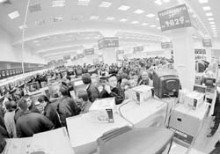“A scandal and an unimaginable panic among buyers. A true assault on the household appliances market, for which we (the Eldorado “hypermarket” at 44 Hlybochytska Street) are also to blame.” This text printed on the leaflets being passed out on every street corner and stuck on subway car walls proved prophetic indeed. In practice, everything happened exactly like this, except for a seemingly insignificant detail. The ad did not say a word that the “assault on household appliances” would result in human injuries, ambulances, and a police squad to control the crowd. Eyewitnesses say this spectacle reminded them of their militant youth with the long Soviet long lines for carpets, vodka, and glassware, numbers written on one’s hand, and an indescribable jubilation at buying the coveted item. On April 18 these memories were stirred up by household appliances which, if we go by the advertisement, of course, could be sold for a song to those first to get to the store.
Indeed, the declared prices were not typical of this category of goods. For example, a vacuum cleaner and a microwave oven were up for grabs at as few as 199 and 349 hryvnias respectively. In a word, it is very easy to explain why almost a thousand people came, the more so that, as psychologists say, the overwhelming majority of Ukrainian consumers can be referred to the category of bargain hunters. Their buying activity boils down to picking up an item as cheaply as possible and then proudly flashing it around at home: look, what a nice bargain I got! It is the frugality of Ukrainians that forms the basis of a relatively new prize and gift technique to attract buyers: you pay for one and get one free. Although the additional gewgaw is not always of use and is, as a rule, of inferior quality, this nevertheless increases interest in a given store. But such actions usually have no dramatic consequences except perhaps for disappointment over misspent money.
What happened at Eldorado is quite different. Olena Donchenko, Ph.D. in sociology and chief of the mass psychology laboratory at the Institute of Social and Political Psychology, also an eyewitness, thinks this was a classic manifestation of mob psychology, when a person loses his/her individuality and self-preservation instinct and becomes part of a qualitatively new organism. The eyewitness psychologist says the situation immediately produced several leaders who called on the maddening crowd people to follow them and maintain discipline.
Yet, the eyewitnesses interviewed by The Day and those who have only heard of this lay the blame on the ill-considered advertising campaign: leaflets were handed out everywhere and put up in subways, but the street on which the hypermarket stands is rather narrow, to put it mildly. Moreover, the rather ill-advised prefix “hyper” clearly does not fit the premises. Such advertising drawbacks are becoming traditional in Ukraine, says Iryna Klievak from the Ukrainian Center for Engineering, Management, and Market Research.
Eldorado employees refused to speak about their own mistakes and the way they felt in connection with what had happened. In principle, it is easy to see their point: although the line was not so chaotic, there were still too many people outside the store. Indignant outcries came in from all sides: why can an individual buy only one cut-rate item, why can a bought item be returned only within two weeks, why does the true state of affairs differ from the one being advertised? This undoubtedly raises never-ending questions not only among those who was, is, and will be standing in line (the campaign is to last for three days).
Why were the discounts so big? The answer is that only old goods were sold at a discount. In addition, many are aware of the following advertising ploy: sellers first mark up prices and then announce big discounts. But in this case this ploy seems to have been reversed: first discounts, then real prices. A lucky move — if, of course, the mass psychosis of consumers can be considered good luck.







